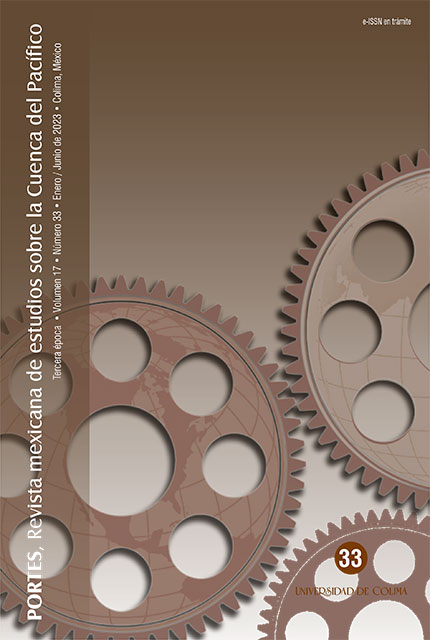Taiwan’s presence in the Latin American and Caribbean region
Keywords:
Taiwan, Latin America, the Caribbean, ChinaAbstract
In contemporary world politics, Taiwan is, for different reasons, a subject of great contention. The constant conflict it faces with Beijing over the claim to fully integrate it into its sovereignty, in the conception of a single China, limits its expectations as a possible independent state. Given this, and in a long-standing dispute, the groups in power, both in Beijing and in Taipei, confront each other precisely because of these visions, which is the object of constant encounters and disagreements. Thus, and intending to firmly maintain international recognition through a low-profile strategy, Taiwan has maintained formal ties with different states in different regions of the world, including Latin America and the Caribbean. This has allowed the use of its official links in some countries in the area, which are exposed to pressure from the government of the People’s Republic of China, which appears as a counterweight to Taipei’s efforts. With this background, the purpose of this paper is to describe that the presence of Taiwan in Latin America and the Caribbean depends on the ability of its political leaders to materialize initiatives whose impact is not of great importance in the dynamics of regional politics and economics. This will allow you to avoid situations that jeopardize the achievements achieved so far and allow you to continue with this status quo created over time.
Downloads
References
Cornejo, R. (Coord.) (2008). China. Radiografía de una potencia en ascenso. México: Centro de Estudios de Asia y África. El Colegio de México.
De los Reyes, M. (2010). China y Taiwán. Hacia la resolución del conflicto. Revista de relaciones internacionales, (10). (S.d.). https://www.iri.edu.ar/revistas/revista_dvd/revistas/R10/R10-EDEL.html
Embassy Pages. (s.f.) Taiwán: Embajadas y consulados. https://www.embassypages.com/taiwan_es
Escudé, C. (2008). Una investigación en el mercado de las ideas: la penetración global del concepto de realismo periférico en la bibliografía especializada en relaciones internacionales. 1a ed. Buenos Aires: Univ. del CEMA. https://ucema.edu.ar/publicaciones/download/documentos/387.pdf
Fontdegloria, X. (21 de agosto de 2018). Taiwán se queda sin otro aliado en América Latina. Ahora es El Salvador. El País. https://elpais.com/internacional/2018/08/21/actualidad/1534828383_860884.html
Huang, Kwei-Bo. (2018). Taiwan´s new southbound policy: Background, objectives, framework, and limits. National Chengchi University. UNESCO Journal, (46), 48-52. http://www.unisci.es/wp-content/uploads/2018/02/UNISCIDP46-3Key-Bopdf.pdf
Klinger Pevida, E. (2021). Dinámica geopolítica de las relaciones estratégicas entre la República Popular China y América Latina y el Caribe. Interacción Sino-Iberoamericana / Sino-Iberoamerican Interaction, 1(1), 42-62. https://doi.org/10.1515/sai-2021-2008
Martínez Cortés, J. I. (Coord) (2015). América Latina y el Caribe. Relaciones políticas. Real Academia de América Latina y el Caribe. UDUAL, UNAM, Cechimex. México.
Ministerio de Asuntos Exteriores (2017). ¿Cuál es el problema de Taiwán? Embajada de la República Popular China en la República Oriental del Uruguay. https://www.mfa.gov.cn/ce/ceuy//esp/ztlm/zgtw/t386948.htm
Secretaría de Gobernación. México (s.f.). Definición de estado. Glosario del Sistema de Información Legislativa. http://sil.gobernacion.gob.mx/Glosario/definicionpop.php?ID=96
Stoessinger, J. (1980). El poderío de las naciones. Política mundial de nuestro tiempo. Tercera Edición. Editorial Gernika. Montevideo.
Vidal, M. (16 de enero de 2016). La presidenta de Taiwán reclama “democracia” e “identidad nacional.” El País. https://elpais.com/internacional/2016/01/16/actualidad/1452964297_578105.html
Zorrilla, D. (20 de enero de 2022). El asunto de Taiwán. La búsqueda de la reunificación nacional de China. Foreign Affairs Latinoamérica. México. ITAM. https://revistafal.com/el-asunto-de-taiwan/
Downloads
Published
How to Cite
Issue
Section
License
Copyright (c) 2023 University of Colima

This work is licensed under a Creative Commons Attribution-NonCommercial-ShareAlike 4.0 International License.
La revista PORTES de la Universidad de Colima se distribuye bajo una Licencia Creative Commons Atribución-NoComercial-CompartirIgual 4.0 Internacional






